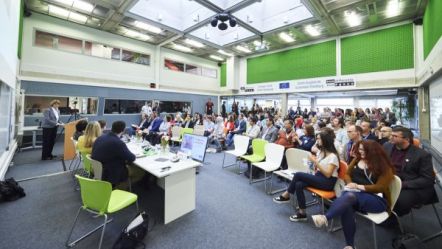Youth work and youth policy responses

The Youth Department guides member states in the development of their national youth policies, using recommendations from the Committee of Ministers, as well as other texts. All guidelines are firmly based on the Council of Europe’s values, and aim to ensure a minimum level of standards in youth policy throughout Europe.
Issues related to gender, gender equality and gender-based violence have always been a part of the Council of Europe youth sector’s strategy and activities. In 2008, at the 8th Conference of Ministers responsible for Youth, a strategic document on youth policy – known as Agenda 2020 – was approved by the Youth Ministers. This strategic document set the implementation of gender equality and the prevention of all forms of gender-based violence as one of the priorities for the youth sector.42
Guidelines on integrating and mainstreaming gender equality into the intercultural youth activities
Attention has been given to this priority at the level of the Council of Europe as a whole, and also at national level, where it has been taken into account by member states in their youth policy development and implementation. The principle of gender equality is applied in the educational programme of activities which strives to include people of different genders and which addresses the topics of gender, gender equality and gender-based violence. In 2017, the Joint Council on Youth, which is jointly responsible for decision making in the Youth Department,43 adopted the 'Guidelines on integrating and mainstreaming gender equality into the intercultural youth activities of the Council of Europe and its partners' 44. These Guidelines were intended to support organisers and educational teams in intercultural youth activities of the Council of Europe and its partners in ensuring gender equality in all phases of an activity or project.
The work on gender, gender equality and gender-based violence has been particularly visible in human rights education programmes run by the Council of Europe youth sector. The experiences of the training courses, study sessions and educational resources developed in the European Youth Centres, such as the Compass manual, contributed greatly to the development of the Council of Europe Charter on Education for Democratic Citizenship and Human Rights Education. This document establishes gender equality as one of the aims of human rights education and education for democratic citizenship.

No Hate Speech movement and Enter! project
The No Hate Speech Movement youth campaign implemented by the Council of Europe between 2013 and 2018 mobilised hundreds of thousands of young people to act against hate speech online, including sexist and homophobic hate speech.
In 2009, the Council of Europe’s youth sector initiated the Enter! project, to develop youth policy responses to exclusion, discrimination and violence affecting young people – particularly in disadvantaged neighbourhoods. Based on the activities of the project, the Committee of Ministers of the Council of Europe adopted Recommendation CM/Rec(2015)3 on the access of young people from disadvantaged neighbourhoods to social rights. The Recommendation calls on member states to develop gender-sensitive approaches to the development of youth policies in disadvantaged neighbourhoods, and provides support for capacity building and for the equal participation of young women and young men aiming to improve gender equality among young people living in disadvantaged neighbourhoods.
Gender-related issues cut across all areas of the Youth Department’s work, including in dealing with challenges faced by marginalised groups, such as refugees or Roma people. The Youth for Democracy programme, within which these activities are implemented, prioritises combating all forms of discrimination and exclusion and addressing intersectionality (including gender equality, sexual orientation LGBTQI, gender identity and disability).
Recommendation on Youth Work
In 2018, the Committee of Ministers of the Council of Europe adopted a Recommendation on Youth Work (CM/Rec(2017)4).45 This Recommendation encourages member states to develop and strengthen youth work policies and practice. It also includes proposals for the youth sector of the Council of Europe to support member states in this task, maximising the positive contribution that youth work can make to Europe’s future through co-operation, peer learning and collaboration. Youth work is defined in the document as:
a wide variety of activities of a social, cultural, educational, environmental and/or political nature by, with and for young people, in groups or individually. Youth work is delivered by paid and volunteer youth workers and is based on non-formal and informal learning processes focused on young people and on voluntary participation. Youth work is quintessentially a social practice, working with young people and the societies in which they live, facilitating young people’s active participation and inclusion in their communities and in decision making
.
The Recommendation on Youth Work draws special attention to the fact that youth work needs legal and political support, sustainable funding and structures, improved co-ordination both across sectors, and between local and national levels, as well as a competency-based framework for the education and training of youth workers. Such demands are particularly important when working with issues of gender, gender-equality and gender-based violence: work on these issues can be particularly challenging in contexts where there is a hostile environment or where strong gender stereotypes prevail.
42 The future of the Council of Europe youth policy: AGENDA 2020, 8th Council of Europe Conference of Ministers responsible for Youth, Kyiv, Ukraine, 10-11 October 2008.
43 Read more about co-management in the Youth Department of the Council of Europe.
44 Gender equality in the intercultural youth activities of the Council of Europe and its partners, Guidelines adopted by the Joint Council on Youth at its 36th meeting – March 2017.
45 Recommendation CM/Rec(2017)4 of the Committee of Ministers to member States on youth work.


